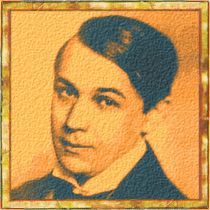[biography] - [quotes] - [publications]

 ould
you like to play that we die?
ould
you like to play that we die?
( Dezső Kosztolányi)
1885 born in Szabadka
1901 his first poem was published in Budapesti Napló
1904 he attended the university at Vienna
1906 he studied arts at Péter Pázmány University Budapest, but never
finished his studies; he became an editor at Budapesti Napló
1908 he was published in Nyugat
1930 president of the Hungarian PEN Club
1936 he died in Budapest
Poet, essayist, short story writer, novelist; one of the
greatest translators of world literature (among others, he translated
Shakespeare, Wilde, Rilke, Goethe, Baudelaire, Verlaine and Maupassant).
"In a self-portrait of 1932, Kosztolányi proclaims himself to be
a happy man, because he enjoys writing, and can do so. He also reiterates
his firm belief in art for art's sake: the only purpose of a poem is
to be beautiful. ...And he adds, 'the ivory tower is still a more human
and cleaner place than a party office'. Finally he declares that his
morality is that of the homo aestheticus as opposed to that of the homo
moralis, ...the contrast is an improbable one, since the defence of
an aesthetic stance is itself a moral act. In Kosztolányi's philosophy,
however, the homo aestheticus is a man devoted to beauty, while the
homo moralis is cruel to himself and others, demanding, one-sided and
narrow-minded, full of contradictions, one who starts wars and revolutions,
lights pyres, hangs and forces others to mortification of the flesh
and makes slaves of them, all with the promise of a better future which
never comes to pass. 'He dangles before us promises of paradise, and
invariably transforms the world into a vale of woe.' Set in the background
of its time - the world economic crisis and the rise of fascism - it
is not surprising that he defended his position so strongly." (George
Cushing)
[biography] - [quotes] - [publications]
 |
Frankfurt '99
Non-profit Organisation,
Budapest 1054 Báthori u. 10. Fax: +(36) 1 269 20 53 E-mail: frankfurt_99.kht@mail.matav.hu |
|